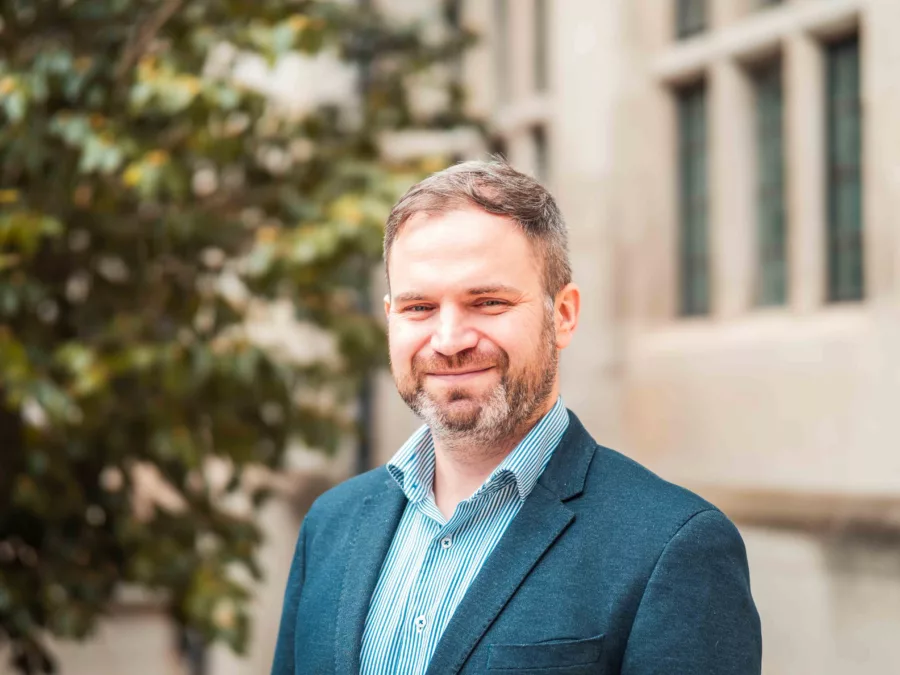Moldova: advocating for displaced people’s rights

People who flee Transnistria – a separatist region in Moldova – have no right to protection under Moldovan law. Human rights lawyer Vadim Vieru is advocating for legislation to change this.
Transnistria is part of Moldova but has been under Russian control since 1992. The de facto government, supported by Russia, does not tolerate any form of dissent.
“In the Transnistria region, there are all kinds of human rights violations, including the death penalty,” says Vadim. “Civil and political rights don’t exist in the region. For example, if you go and protest in front of a public building, with a poster in your hand, you will be accused of extremism and imprisoned for five to ten years.”
He adds: “People have two choices. Either they must accept the human rights violations and continue to do everything asked by the de facto administration or they must leave.”
Defending human rights
Vadim, who is participating in our 2024/25 Wider Europe and Central Asia fellowship programme is a programme director at Promo-LEX, a Moldovan NGO dedicated to defending human rights. He specialises in strategic litigation before the European Court of Human Rights and is involved in work to release political prisoners in Transnistria.
When people from Transnistria cross into Moldovan-controlled territory, they have no legal status. Because there is no framework for state support, they often approach Promo-Lex for help. For his action plan during his John Smith Trust fellowship, Vadim wants to implement legislation to safeguard the rights of internally displaced people (IDPs) in Moldova.
“We lack national legislation on IDPs,” he explains. “The main issue is housing; there’s a need for temporary shelters. People also need access to medical care, social protection and education. They have to change their identity papers because so-called Transnistrian citizenship is not internationally recognised.
“To provide the minimum help according to UN standards we must regulate IDP status. It’s not just about shelter. It’s about helping people get documents and register with the official bodies.”
Russian energy blackmail
Since Russia’s full-scale invasion of Ukraine in February 2022, the situation in Transnistria has worsened. The de facto administration clamped down further on freedom of expression, detaining journalists and others opposed to the war. Promo-Lex represented a man who was imprisoned for two years for hanging a Ukrainian flag from his balcony, securing his release in May 2024.
According to Vadim, Russia is using Transnistria to put pressure on the Moldovan government through an aggressive hybrid war. As well as holding political prisoners, another potent weapon is energy blackmail. On 1 January 2025, Russia cut gas supplies to the region bringing it to the brink of a humanitarian crisis.
In February, the de facto administration made an energy deal underpinned by Russian credit and rejected a €60 million European Union aid package. This means Moscow will continue to use people in the region “as hostages to put pressure on Moldova”, says Vadim.
Election interference
Around 90% of the population in Transnistria has the right to vote in Moldovan elections, giving Russia leverage over Moldova’s democratic process. “With parliamentary elections due in 2025, one of the objectives of this energy crisis is to send a message to the local people,” Vadim says. “The message is: ‘If you do not vote for the pro-Russian candidate, you will be in this situation again. You will freeze in the winter.’”
Russian propaganda has been so effective that people in Transnistria blame Moldova for the situation. Vadim says: “I was in the region a few weeks ago and people were very angry, not with the Russian Federation, but with the Moldovan government – even though the Moldovan government is trying to help them.
“Legislation on the IDP issue may be a way to show people that we are trying to help and protect them. It’s a complex issue, but it’s crucial.”
Advocacy opportunity
The energy crisis has increased awareness at an EU level of the situation in Transnistria. This has provided an advocacy opportunity for Vadim and his colleagues at Promo-Lex to encourage the Moldovan government to legally recognise internally displaced people.
He says: “The Ministry of Social Protection is now more open to discussing the issue. We have set up a working group to create legislation for IDPs and we have strong advocacy support from the EU. The challenge is to make the government understand that it’s not just about providing shelter. We need to provide legal solutions to address different aspects like education, social protection and medical care.”
During the residential part of his fellowship, Vadim will meet with UK researchers specialising in refugee and displacement issues, including Professor Alison Phipps OBE, the University of Glasgow’s holder of the UNESCO Chair on Refugee Integration through Education, Language and Arts. Vadim says: “That research experience from the UK will provide important tips for me on how to address the issue and make our policies very practical.”
Vadim is also looking forward to learning from Fellows from countries in the region, such as Georgia and Ukraine, which have internally displaced populations.
Human stories
At the same time as delivering his ambitious action plan, Vadim continues to work on human rights litigation, prison rights and extradition cases. “A recent case is a man who is wanted in the region because he asked people to defend their human rights on Facebook,” he says. “After being imprisoned for 20 days, he managed to get released on bail and escaped the region. We have been helping him in Chişinău.”
The man, who has terminal cancer, needed shelter and access to chemotherapy. “In his case, we managed to collaborate with the government to find him shelter in a centre for victims of human trafficking – and he has started chemotherapy,” says Vadim. “Every story is very different. They’re human stories. And it’s my possibility to change people’s lives in a good way, which motivates me in my work.”
Find out more about our fellowship programmes
